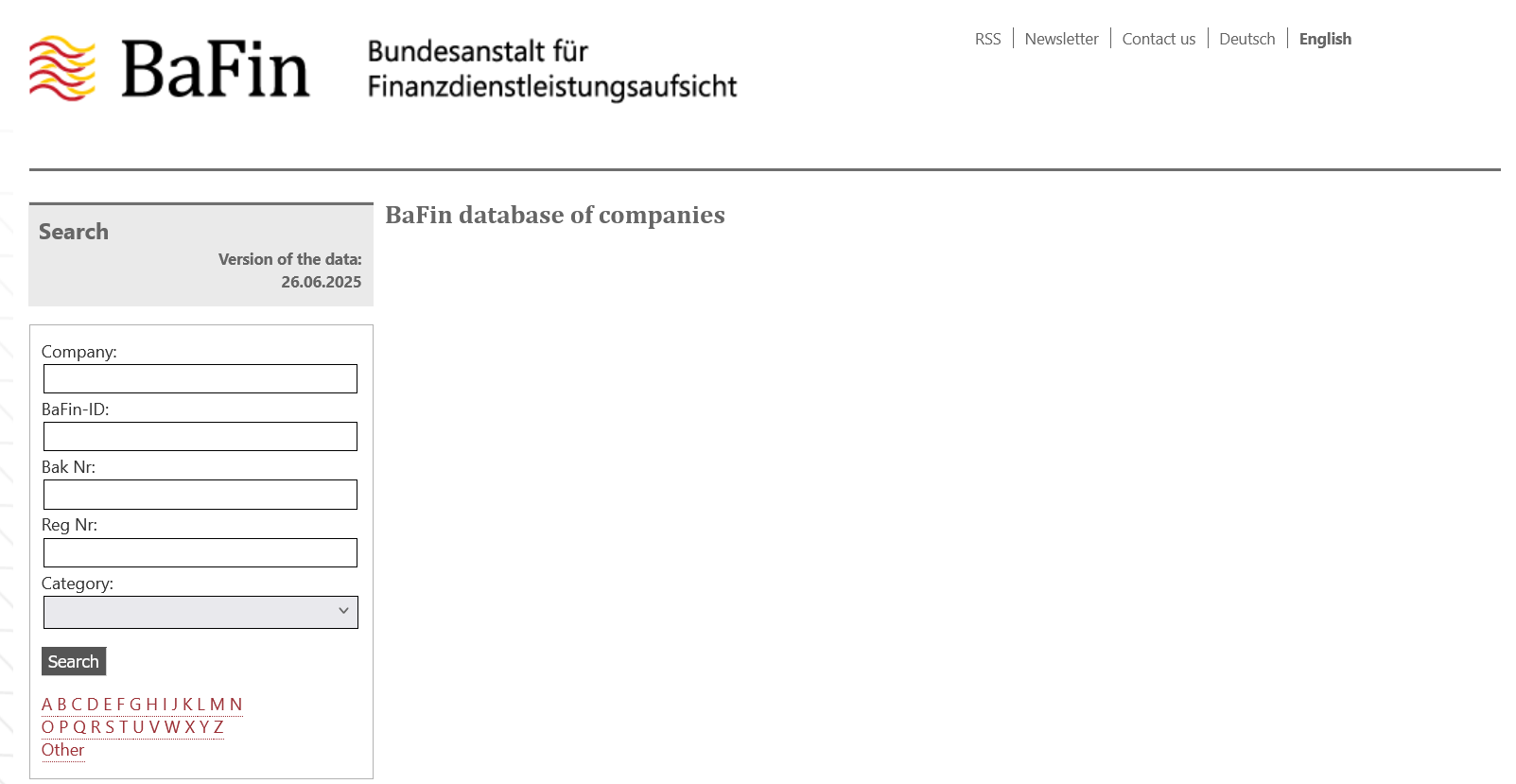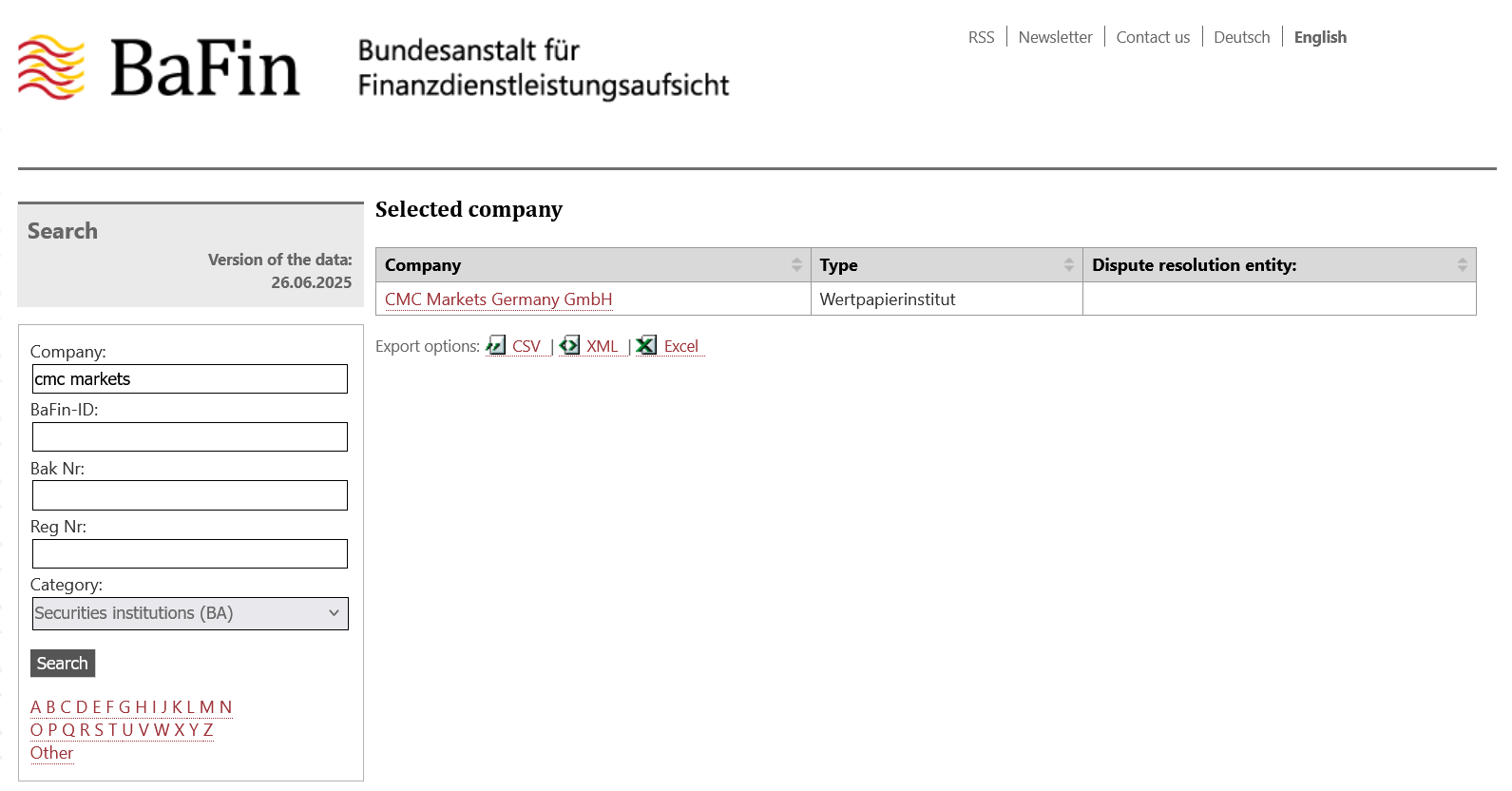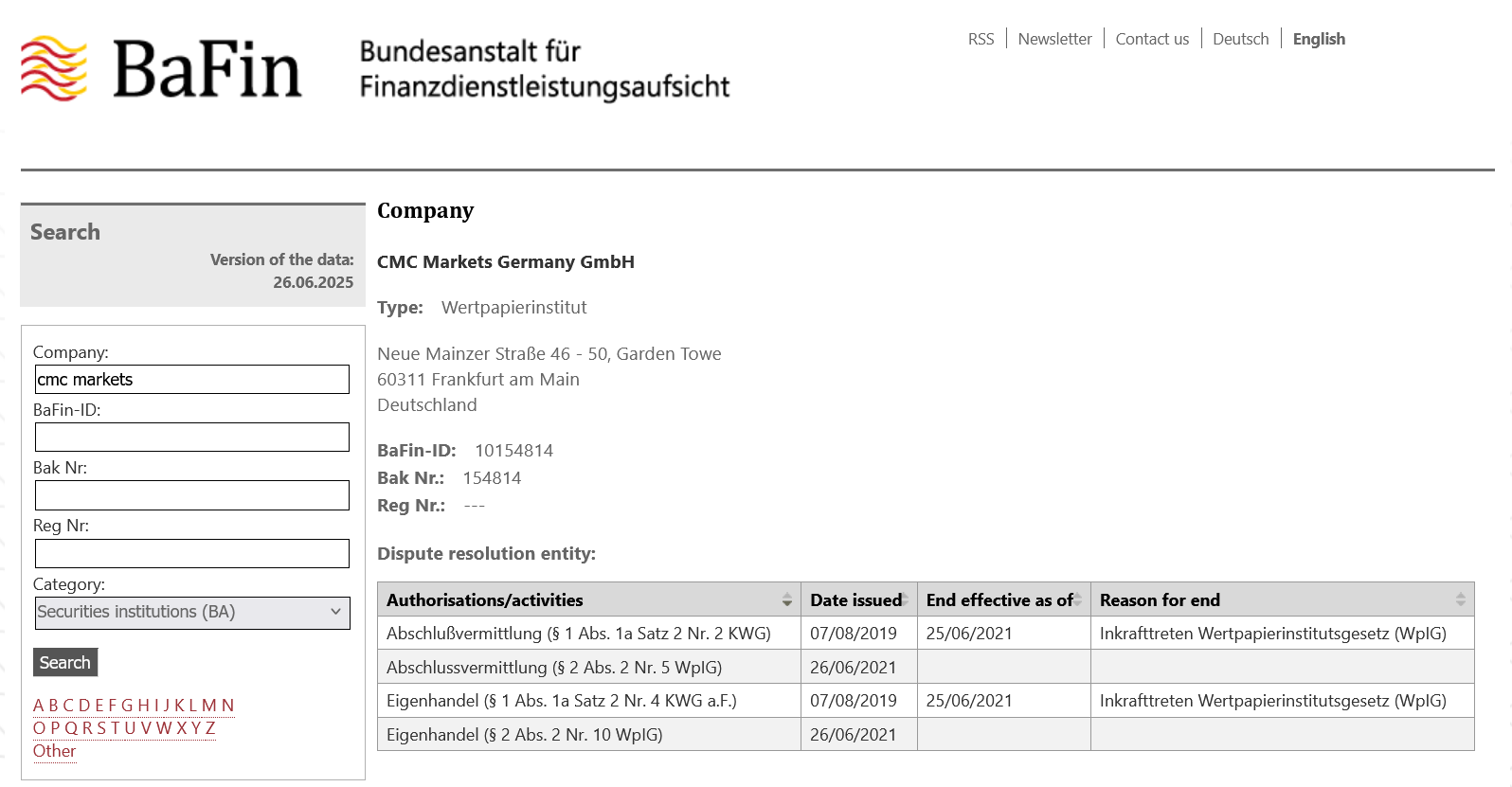Best Federal Financial Supervisory Authority (BaFin) Regulated Brokers 2026
We’ve personally tested and ranked the top brokers regulated by Germany’s Federal Financial Supervisory Authority (BaFin), ensuring high standards of trust.
-
1Pepperstone, established in Australia in 2010, is a highly-regarded forex and CFD broker serving more than 400,000 international clients. It provides access to over 1,300 instruments through leading trading platforms such as MT4, MT5, cTrader, and TradingView, while keeping fees relatively low and transparent. The company is regulated by known authorities including FCA, ASIC, and CySEC, offering a safe trading environment for all.
-
2
Trust Platform Assets Fees Accounts Research Education Mobile Support 4.0 FXCM is a well-known forex and CFD broker that was set up in 1999. Its head office is in the UK, but it operates globally, including in places like Australia. FXCM offers trading without any commission fees, a selection of more than 400 assets, and a variety of analysis tools. Many traders prefer it, which is why it has received several awards. Major entities such as FCA, ASIC, CySEC, FSCA, and BaFin regulate FXCM. -
3
Trust Platform Assets Fees Accounts Research Education Mobile Support 4.7 Established in 1989, CMC Markets is a reputable brokerage firm authorized by various top regulators such as the FCA, ASIC and CIRO, and is listed on the London Stock Exchange. They boast a global client base of over 1 million traders and have received numerous awards.
Compare the Best BaFin-Regulated Brokers
Safety Comparison
Compare how safe the Best Federal Financial Supervisory Authority (BaFin) Regulated Brokers 2026 are.
Mobile Trading Comparison
Compare the mobile trading features of the Best Federal Financial Supervisory Authority (BaFin) Regulated Brokers 2026.
Comparison for Beginners
Compare how suitable the Best Federal Financial Supervisory Authority (BaFin) Regulated Brokers 2026 are for beginners.
Comparison for Advanced Traders
Compare how suitable the Best Federal Financial Supervisory Authority (BaFin) Regulated Brokers 2026 are for advanced or professional traders.
Accounts Comparison
Compare the trading accounts offered by Best Federal Financial Supervisory Authority (BaFin) Regulated Brokers 2026.
Detailed Rating Comparison
Compare how we rated the Best Federal Financial Supervisory Authority (BaFin) Regulated Brokers 2026 in key areas.
Fee and Cost Comparison
Compare the cost of trading with the Best Federal Financial Supervisory Authority (BaFin) Regulated Brokers 2026.
Broker Popularity
See how popular the Best Federal Financial Supervisory Authority (BaFin) Regulated Brokers [year] are in terms of number of clients.
| Broker | Popularity |
|---|---|
| Pepperstone |
|
| CMC Markets |
|
| FXCM |
|
Why Trade With Pepperstone?
Pepperstone is a leading choice for trading with low spreads, quick execution, and advanced charting for experienced traders. New traders benefit from no minimum deposit, a wealth of educational resources, and 24/7 support. Operating under ASIC regulation, Pepperstone is a top option for Australian traders and won DayTrading.com's 'Best Aus Broker' award for 2025.
Pros
- Pepperstone has won several annual DayTrading.com awards, including 'Best Overall Broker' in 2025 and 'Best Forex Broker' runner-up in 2025.
- Get top-notch customer support through phone, email, or live chat. Expect responses within <5 minutes based on our trials.
- Support for numerous top-charting platforms such as MT4, MT5, TradingView, and cTrader. These cater to different short-term trading styles, including algorithmic trading.
Cons
- Pepperstone does not support cTrader Copy, a popular feature in the cTrader platform available at alternatives like IC Markets, though it has launched an intuitive copy trading app.
- Despite expanding its market range, crypto options are limited compared to other brokers in this area, and there is no option to invest in actual coins.
- Pepperstone's demo accounts last for 30 days. This might be insufficient for learning the various platforms and testing trading strategies.
Why Trade With FXCM?
FXCM is a top choice for traders using automated strategies because of its four strong platforms, strategy testing, and API trading. The company is also highly recommended for active traders due to its reduced spreads and minimal or zero commissions on frequently traded assets.
Pros
- The broker provides spread reductions and other great benefits for skilled traders using the Active Trader account.
- FXCM is a globally respected trading company, thanks to its licensure from FCA, ASIC, CySEC, and FSCA and a solid 20-year business track record.
- Traders have access to high-quality trading tools: a market scanner, forex signals and eFXPlus, a third-party research site.
Cons
- The live chat support might not be as quick or dependable as that of leading competitors.
- Traders do not have the option to choose between different retail accounts, and there are no options for Cent/Micro accounts.
- FXCM primarily caters to proficient traders, but unfortunately, they do not provide managed accounts.
Why Trade With CMC Markets?
CMC Markets offers a great online platform for traders. It has advanced charting tools and a wide variety of CFDs to trade, including a large selection of currencies and customized indices. It caters to traders at all levels.
Pros
- The CMC web platform offers an excellent user experience, featuring advanced charting tools and customizable options for trading. It suits both beginners and experienced traders. It supports MT4 and will add TradingView in 2025.
- We upgraded its 'Assets & Markets' rating due to frequent product additions in early 2025, including extended hours trading on US stocks and new share CFDs.
- The brokerage excels by offering various useful resources. These include scanners that identify trading patterns, webinars, tutorials, updates from news outlets, and research from esteemed companies like Morningstar.
Cons
- While the web platform has improved, it still needs more enhancements to be as user-friendly for trading as competitor software such as IG.
- CMC provides a commendable range of assets, but lacks support for actual stock trading and UK customers are unable to trade cryptocurrencies.
- The CMC Markets app provides full trading services, but its design and user experience are not as good as leading competitors such as eToro.
Filters
How BrokerListings.com Selected the Top BaFin Brokers
To identify the best brokers regulated by BaFin (Germany’s Federal Financial Supervisory Authority), we followed a strict, research-driven selection process:
- We first verified each firm’s regulatory status through BaFin’s official registry, confirming they hold a valid license under MiFID II and operate in compliance with German financial law.
- From there, we applied our proprietary broker rating framework – analyzing over 200 individual data points, including platform reliability, fees, tools, and client protections.
- We also conducted hands-on testing to ensure the brokers deliver not only regulatory integrity, but also real-time performance for active traders.

What Is BaFin?
The Bundesanstalt für Finanzdienstleistungsaufsicht – or BaFin for short – is the body assigned to regulate and supervise Germany’s financial markets.
Established in 2002, BaFin (whose name translates to the Federal Financial Supervisory Authority in English) was created to bring three other bodies under one roof: the federal supervisory offices for banks, insurance and securities trading.
The regulator’s self-stated main goal “is to ensure the proper functioning, stability and integrity of Germany’s financial system.” We feel that investors can expect a robust level of protection from the body, as reflected by its Category A status under BrokerListings.com’s broker regulator classification system.
BaFin issues licenses to financial brokers and oversees their operations to ensure they adhere to regulations. It has the power to act against organizations that fall foul of its requirements.
What Powers Does BaFin Have?
Like many leading regulated brokers, particularly in the EU, BaFin is tasked with supervising a wide range of institutions under a series of legislative acts, including the Securities Trading Act (WpHG), the Banking Act (KWG) and the Money Laundering Act (GwG).
According to its website, these organizations comprise “banks, financial services institutions, payment institutions, e-money institutions, German branches of foreign credit institutions from the European Economic Area, insurers, Pensionsfonds, German asset managers and German funds.”
Pro tip: BaFin is responsible for supervising approximately 2,700 banks, 800 financial services organizations and 700 insurance companies.
The regulator can implement a range of punitive measures for infringements, including:
- Issuing financial penalties.
- Revoking or suspending trading licenses and authorizations.
- Demanding that businesses improve their internal processes and operations.
- Publicly naming individuals and companies that breach rules.
- Appointing special commissioners to ensure remedial action is taken.
- Conducting searches of business premises and individuals’ homes.
- Ordering companies to wind down their operations.
In one notable case, the broker flatexDEGIRO was slapped with a €1.05 million fine in February 2023 for failings related to risk management and money laundering prevention.
BaFin also appointed a special commissioner to confirm that “serious shortcomings in [flatexDEGIRO’s] internal controls, its supervisory reporting system and in the area of money laundering prevention” were properly addressed.
What Rules Must A BaFin Broker Follow?
Germany’s membership of the European Union means BaFin’s regulatory framework is heavily influenced by the European Securities and Markets Association (ESMA), the body whose self-stated objective is “to improve investor protection and promote stable, orderly financial markets” across the continental bloc.
More specifically, BaFin’s supervisory rules are based upon the Markets in Financial Instruments Directive II (MiFID II), which ESMA introduced in 2018.
Under the MiFID II regime, financial institutions must “act honestly, fairly and professionally in accordance with the best interests of its clients.” Some of the rules they must follow include:
- Taking appropriate steps to obtain the best trading result for their client based on “account price, costs, speed, likelihood of execution and settlement, size, nature or any other consideration.”
- Guaranteeing that all information (including promotional materials) provided to customers and potential customers “shall be fair, clear and not misleading.”
- Ensuring the product or service discussed is “suitable” and “appropriate” according to the individual’s knowledge and experience.
- Providing appropriate information (such as the firm’s services, product ranges, execution venues and costs) “in good time.”
- Putting procedures in place “to identify and to prevent or manage conflicts of interest” between the firm, associates of the company and its customers.
- Maintaining adequate arrangements “so as to safeguard the ownership rights of clients” when holding financial instruments belonging to clients.
- Establishing procedures “for records to be kept of all services, activities and transactions undertaken by it.”
- Introducing reasonable steps “to ensure continuity and regularity in the performance of investment services and activities.”
How Can I Check If A Brokerage Is BaFin Regulated?
Individuals can swiftly and easily check whether a broker is BaFin approved using the regulator’s dedicated company database:

Opening up BaFin’s company database. Source: BaFin
Let’s say that I want to check the broker I’m considering – CMC Markets – is licensed to deal in Germany. I can type the firm’s name into the search field, its BaFin ID number (which can typically be found on brokers’ websites), and narrow down the field (if required) by selecting institution type.
Here’s what I found after filling in the company’s name, specifying the nature of its operations and hitting ‘Search’:

Locating CMC Markets Germany. Source: BaFin
The whole process took just a minute or two from start to finish. My research shows that CMC Markets is authorized to trade in Germany, along with the company’s address and the date on when it received its regulatory licenses:

CMC Markets Germany’s in-depth profile. Source: BaFin
Pro tip: BaFin also maintains a warning list of companies that have found to be operating without legal authorization.
As an alternative to its company database, the regulator operates a consumer helpline through which a broker’s authorization can be verified. This service can also be used for individuals to file a complaint, ask questions regarding financial products, and check their consumer protections among other things.
The helpline is open between 8am and 6pm Central European Time (CET), Monday through Friday. It can be reached on 0 800 2 100 500 from inside Germany, or +49 (0) 228 299 70 299 from outside the country.
Bottom Line
Traders can expect a strong level of protection by choosing BaFin-licensed brokerages. They can also have confidence in the smooth and fair functioning of Germany’s broader financial markets under the current regulatory regime.
Article Sources
- Bundesanstalt für Finanzdienstleistungsaufsicht (BaFin)
- Functions & history – BaFin
- Finanzdienstleistungsaufsichtsgesetz – FinDAG – BaFin
- Acts – BaFin
- Penalties for infringements – BaFin
- Bundesanstalt für Finanzdienstleistungsaufsicht (BAFin) – Deutsche Börse
- flatexDEGIRO Bank AG and flatexDEGIRO AG financial holding group: BaFin orders supervisory measures – BaFin
- European Securities and Markets Association (ESMA)
- MiFID II – ESMA
- Company database – BaFin
- Enforcement relating to unauthorised business – BaFin
- BaFin consumer helpline – BaFin


